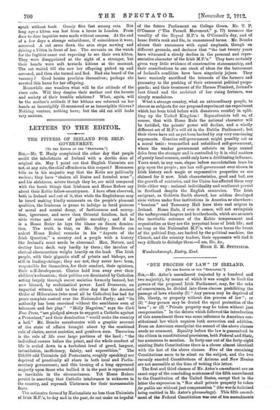LETTERS TO THE EDITOR.
THE FITNESS OF IRELAND FOR SELF- GOVERNMENT.
[To TER EDITOR or THE "Sracraros.") Slit,—Mr. T. Healy complained the other day that people credit the inhabitants of Ireland with a double dose of original sin. May I point out that English Unionists are not, at any rate, the chief offenders in this respect ? Mommsen tells us in his majestic way that the Kelts are politically useless; they have " shaken all States and founded none "; and his strictures, severe though they be, are mild compared with the harsh things that Irishmen and Home Rulers say about their Keltic fellow-countrymen. I have often observed, both in Ireland and out of it, that while the Englishman may be heard making kindly comments on the people's pleasant qualities, the Irishman is prone to indulge in lurid pictures of moral and mental decay, of factiousness and corrup- tion, ignorance, and more than Oriental fatalism, lack of civic virtue and sense of public morality ; and if he is a Home Ruler he lays the blame on Saxon domina- tion. The truth is that, as Mr. Sydney Brooks (an ardent Home Ruler) remarks in his " Aspects of the Irish Question," a country and a people with a history like Ireland's must needs be abnormal. Man, Nature, and destiny have dealt very hardly by them ; the incubus of clerical obscurantism weighs heavily on the land. The Irish people, with their gigantic staff of priests and bishops, are still in leading-strings; they are not, they never have been, responsible for themselves, for their conduct, their opinions, their self-development. Clerics hold iron sway over their children's education; their politics are dominated by Catholics acting largely through secret societies formerly banned, but now blessed, by ecclesiastical power. Lord Dunraven, an impartial witness, told ns the other day that the Ancient Order of Ribernians (who must all be Catholics) has had for years complete control over the Nationalist Party; and " its authority has been exercised without the semblance even of tolerance and fair play." "Molly Maguires," says the Cork Free Press, "are pledged always to support a Catholic against a Protestant," and their domination " would make the country a hell." Mr. Brooks corroborates with a graphic account of the state of affairs brought about by the combined rule of clerics, secret societies, and gombeen men. Terrorism is the rule of life over large portions of the land : " the individual cowers before the priest, and the whole conduct of life is scaled down to a turbulent level of greed, languor, intimidation, inefficiency, falsity, and superstition." The 250,000 odd Unionists (all Protestants, roughly speaking) are deprived of practically all share in both local and Parlia- mentary government; and this turning of a long oppressed majority upon those who bullied it in the past is represented as inevitable in the circumstances. Yet Home Rulers persist in asserting that Catholic intolerance is unknown in the country, and reproach Ulstermen for their unreasonable fears.
The estimates formed by Nationalists no less than Unionists of Irish M.P.'s, to-day and in the past, do not make us hopeful of the future Parliament on College Green. Mr. T. P. O'Connor (" The Parnell Movement," p. 77) trounces the venality of the Repeal M.P.'s in O'Connell's day, and of Isaac Butt's rank and file, in unmeasured terms. Mr. Brooks abuses their successors with equal emphasis, though on different grounds, and declares that "the last twenty years have witnessed a steady decline in the personal and repre- sentative character of the Irish M.P.'s." They have certainly given very little evidence of constructive statesmanship, and their contributions to our stock of ideas for the betterment of Ireland's condition have been singularly jejune. They have wantonly sacrificed the interests of the farmers and peasantry to the pushing of their extremist political propa- ganda; and their treatment of Sir Horace Plunkett, Ireland's best friend and the architect of her rising fortunes, was simply scandalous.
What a strange country, what an extraordinary people, to choose as subjects for our proposed experiment (an experiment which has been tried before with disastrous results) in split- ting up the United Kingdom ! Separationists tell us, of course, that with Home Rule the national character will be fortified, the priests' power will decline, and a wholly different set of M.P.'s will sit in the Dublin Parliament ; but their views have not as yet been backed by any very convincing arguments. Genuine self-government might possibly act as a moral tonic : trammelled and subsidized self-government, where the weaker government subsists on large annual doles from the stronger and is controlled by it in vital matters of purely local concern, could only have a debilitating influence. Years must, in any case, elapse before sacerdotalism loses its grip upon the people ; nor has self-government ever shown in Irish history such magic or regenerative properties as are claimed for it now. Irish characteristics, good and bad, are the growth of centuries, and the Union has affected them very little either way : national individuality and sentiment persist in Scotland despite the English connexion. The Irish emigrant, as Goldwin Smith showed, has seldom developed civic virtues under free institutions in America or elsewhere : " bossism " and Tammany Hall have their real origins in Ireland. Home Rule, if ever it comes, will not extinguish the underground leagues and brotherhoods, which are as much the inevitable outcome of the Keltic temperament and organization as they are the perpetual bane of Irish life; and so long as the Nationalist M.P.'s, who have borne the brunt of the political fray, are backed by the political machine, the Church, and the country traders, their opponents will find it very difficult to dislodge them.—I am, Sir, &c., Woodnesborough, Eastry, Dent.
Hums E. M. STUTFIELD.


























































 Previous page
Previous page